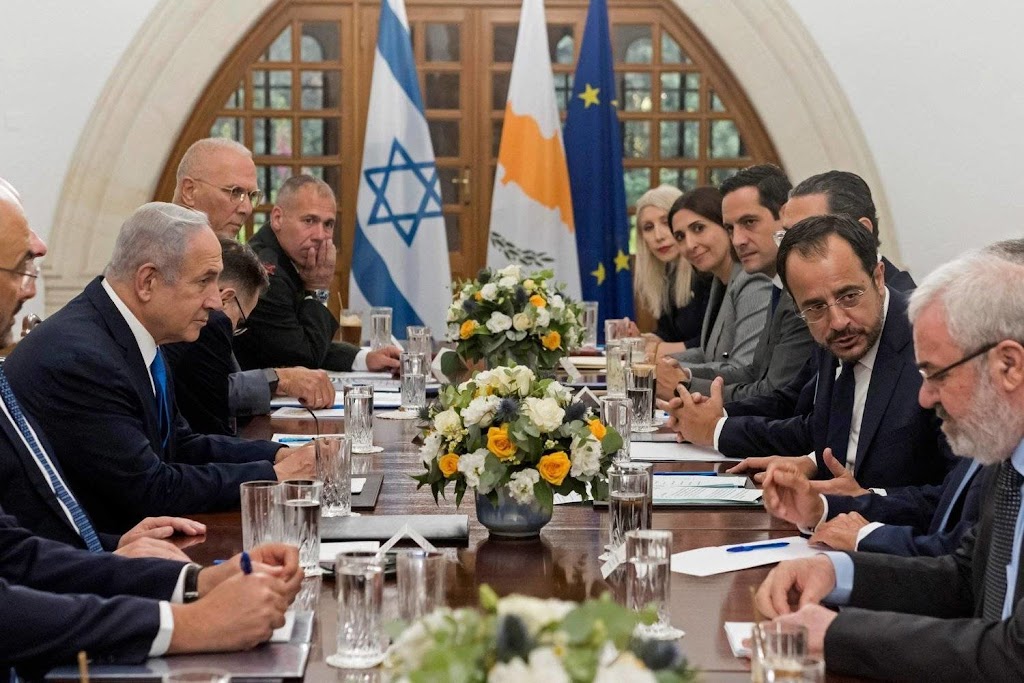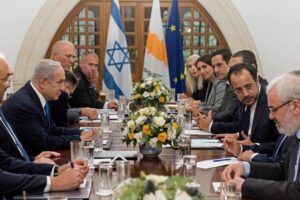
ISRAEL – Israeli Prime Minister Benjamin Netanyahu on Sunday discussed a possible deal to free the hostages taken by Hamas on Oct. 7., Gaza’s governance following the war, and death toll figures produced by Gaza officials in an interview on “Meet the Press.”
Netanyahu told “Meet the Press” that there “could be” a potential hostage deal with Hamas but declined to give any further details, saying doing so could thwart the delicate negotiations to free those taken captive by the militant group. “I think the less I say about it, the more I’ll increase the chances that it materializes,” he said in the interview.
It has been just over a month since Hamas launched its terror attack on Israel on Oct. 7 in a brutal ambush that saw more than 1,200 killed and around 220 people taken hostage.
In the weeks that have followed, Israel’s relentless bombardment of Gaza in response has seen more than 11,000 people killed, while more than 1.6 million people have been displaced, according to health officials in the besieged enclave and estimates from the United Nations.
Potential hostage deal
Asked by host Kristen Welker about how close Israel was to getting the hostages out, Netanyahu said that no deal had been close until his forces began the ground operation in Gaza.
“We heard that there was an impending deal of this kind or of that kind and then we learned that it was all hokum. But the minute we started the ground operation that began to change,” he said.
Pressed again by Welker on whether there is a potential deal to release more hostages, Netanyahu replied: “There could be.”
Any deal, was “the result of pressure, military pressure,” he said, before praising the work of the Israel Defense Forces. “That’s the one thing that might create a deal and if a deal is available. Well, we will talk about it when it’s there. We’ll announce it if it’s achievable,” he said.
Asked if he knew where all the hostages were being held right now, Netanyahu said: “We know a great deal, but I won’t go beyond that.”
A Biden administration official confirmed to NBC News on Sunday that a possible deal for the release of hostages was being discussed.
This would see the release of about 80 women and children in exchange for the release of Palestinian women and teenagers held by Israel, the official, who was not authorized to speak publicly, said.
They added that the U.S. is also exploring other options and there is no certainty that any of them will succeed.
Israeli President Isaac Herzog told NBC News last week that the country has not received a substantial offer from Hamas on a deal to secure the freedom of more than 200 hostages being held in the Gaza Strip, denying reports that a deal is within reach.
“There is no real proposal that is viable from Hamas’ side on this issue. Whilst there are many, many people who are third parties who are sending optimistic messages to the news reels, I’m saying outright: According to my knowledge, up to now, there is no real substantial information that is showing any real offer of any process on the table,” Herzog, Israel‘s head of state, said in an interview in his office in Jerusalem.
Herzog does not make policy but is briefed on Israeli intelligence and on political decisions. Netanyahu’s government makes the decisions surrounding policy.
Gaza governance
Netanyahu said that a “different authority” must govern Gaza, but he declined to say if he would accept an international force to control the region once the war with Hamas is over. The U.S. has said it would oppose an Israeli postwar occupation of Gaza.
Pressed to clarify what he meant by his call for a “different” administration to govern Gaza, Netanyahu said: “I think it’s too early to say.”
Hamas, a militant Palestinian nationalist movement, took control of Gaza — a narrow strip of land wedged between Israel and Egypt on the Mediterranean Sea that is roughly the size of Washington, D.C. — after it gained control by winning an election there in 2006.
However Israel has kept a land, air and sea blockade on Gaza since 2007, despite demands from the United Nations and human rights groups to lift it due the devastating impact it has had on Palestinian civilians. Israel has said the blockade, which allows it to control Gaza’s borders and is also enforced by Egypt, is needed to protect Israeli citizens from Hamas.
While Netanyahu has maintained that Israel would be in charge of security over the region, he has not laid out a plan of governance after the war.
War crime allegations
The United Nations High Commissioner for Human Rights Volker Türk last week accused both Israel and Hamas of committing war crimes.
Asked on “Meet the Press” how many civilians have been killed since Hamas launched its attack on Israel on Oct. 7, Netanyahu disputed the death toll numbers by Gaza officials, whom he called “Hamas officials,” and blamed Hamas for civilian deaths.
“It’s lower than theirs,” he said, before claiming that Israel has seen “a steady decline” in the number of civilian deaths as its ground operation in Gaza proceeds because “people understand that they have to clear the way, and they leave.”
“And remember, our goal, and we’re taking extraordinary efforts to achieve it, is to minimize civilian casualties. This is our ethos,” he said. “We’ll do everything we can to minimize civilian casualties, but you have to do everything in your power to lay the blame for the civilian casualties on where it belongs, on Hamas.”
While demanding an immediate cease-fire and the release of hostages, Türk said Hamas has committed war crimes by holding people captive and Israel has committed war crimes related to its “collective punishment” of Palestinian civilians.
Türk told reporters on the Egyptian side of Gaza’s Rafah border crossing last week that “even in the context of a 56-year-old occupation, the current situation is the most dangerous in decades, faced by people in Gaza, in Israel, in the West Bank but also regionally.”
“The international community needs to be part of finding a just and equitable future for the Palestinian and Israeli people,” he added.
As the death toll mounts, protesters have rallied around the world, including in the United States, to call for a cease-fire that would bring an end to Israel’s bombardment of Gaza.
The Biden administration supports a “humanitarian pause” in the conflict but has not yet called for a cease-fire. Asked by reporters last week on the chances of a Gaza cease-fire, President Joe Biden said: “None, no possibility.” Israel has maintained that it will not agree to any cease-fire without the release of hostages.
However, Secretary of State Antony Blinken said Friday that “far too many” Palestinians have died and suffered in the Gaza Strip. Speaking to reporters in India’s capital New Delhi as he wrapped up an intense nine-day diplomatic tour of the Middle East and Asia, he said: “Much more needs to be done to protect civilians and to make sure that humanitarian assistance reaches them.”
“Far too many Palestinians have been killed, far too many have suffered these past weeks, and we want to do everything possible to prevent harm to them and to maximize the assistance that gets to them,” he said.
Shifa hospital fuel offer
Netanyahu told “Meet the Press” that his country offered fuel to Gaza’s Al-Shifa hospital last night, but it was “refused.”
“We offered actually, last night, to give them enough fuel to operate the hospital, operate the incubators and so on, because we have, obviously, no battle with patients or civilians at all,” he told Welker. “They refused it,” he added after he was pressed on the matter.
Al-Shifa suspended operations Saturday after running out of fuel. Netanyahu’s comments came after the World Health Organization said it lost communication with contacts at the embattled hospital in Gaza City. Multiple babies and five people in intensive care have died at the facility, according to the Gaza Health Ministry.
But, according to Dr. Marwan Abusada, a surgeon at Al-Shifa hospital, Israel’s offer of fuel was only around 2% of what the hospital needed to run in a single day.
The IDF said it had left 300 liters of fuel outside the hospital, but it said Hamas prevented hospital staff from accepting the fuel.
Abusada, who is also the head of international cooperation at the Gaza Ministry of Health, confirmed that the hospital was offered 200 liters of fuel, but said it was not enough — that at least 10,000 liters per day would be needed to run vital parts of the hospital.
“It was just 200 liters,” Abusada said in a call Sunday. “What to do with 200 liters?”
It’s unclear why the IDF said it offered 300 liters and Abusada said the hospital was offered only 200.

